
7 Dead-Simple Ways to Improve Slide Decks
Slide decks are a powerful way to back up any type of presentation from team meetings and sales pitches to conference keynotes and workshops. We've all seen presentations with poor design that takes away from talks, and at worse, completely distracts the intended audience. However, most presenters aren't graphic designers. Slide decks can be frustrating to build, and great slide decks help communicate what an audience needs to hear.
At Moz, I've had the pleasure of working with many speakers on their decks, whether for a biweekly webinar or for MozCon. And while you aren't going to turn into a god of slide decks overnight, there are some easy ways to go from terrible to decent. Decent won't get you heaps of praise for a deck, but it also won't leave a sour taste in someone's mind about your slide skills and will allow them to focus on what you actually have to say.
Here are seven simple tips to sharpen up any deck.
Download the checklist version to help you get started.
 Outline your way to success
Outline your way to success
While we all have different creative processes, I can't recommend enough outlining your deck before you start in on the slide-building. This will help you focus. It will also let you organize the narrative of your presentation's story.
I always refer to my outline as the "everything and the kitchen sink" version. It's typically 2-3 times longer than my allotted time. But it helps me fine tune for the specific audience and make sure tactics (or my message, if not a how-to) stand out.
For example, a few months ago, I gave a social media 101 talk at a burlesque conference. My initial draft and brain-dump outline was way too long, and I quickly realized I could make easy cuts by removing advanced tips. I thought they were cool, but my audience was going to lose me. The tips would've taken away from the presentation.
 Make better presentations by outlining them.
Make better presentations by outlining them.

Get readable fonts and font sizes
Use legible fonts. I know they can be boring, but that's better than most of the audience being frustrated by not being able to read your slides. There are plenty of great free fonts if you hate Times New Roman, Arial, or Calibri, and typographers have put together cheat sheets for matching common font types with each other.
Even at conferences like MozCon where there are two 16-foot (4.8 meters) high screens, font size is still an issue. For legibility, even for the back of the room, we recommend speakers do not use lower than a 36pt font. Or no one will be able to read it.
Ideally, 48-60pt font should be your smallest range, depending on the font. Let's face it, not all of your audience will have perfect vision.
Extra font tip: If you are using any non-standard fonts, please send the fonts to the conference organizer along with your slide decks. Or send a PDF. Fonts are embeddable in most slide deck software, but it's best to make it easy.
 For presentations, use a font no smaller than 36pt and, ideally, 48-60pt.
For presentations, use a font no smaller than 36pt and, ideally, 48-60pt.
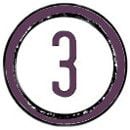
Keep important information away from the sides and bottom
Often times, projectors don't line up perfectly, and there's nothing more distracting than your words slightly sliding off screen. This is also something you can't check beforehand at most events. So add a little padding on either side.
Additionally, unless you're on a very tall stage, put a buffer at the bottom. Even with the raised stage of MozCon, if speakers put text or other important information near the bottom, the heads of the people in closer rows will block it. I recommend putting repetitive branding, such as your company logo or your Twitter handle there.
For assistance, here's an example widescreen template for PowerPoint, Keynote, and PDF that blocks off where images and text should be in your presentation.
 Avoid putting important info too close to the sides or bottom of your slide decks.
Avoid putting important info too close to the sides or bottom of your slide decks.
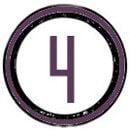
Add the conference hashtag
Marketers love to tweet. I recommend that you put both your own Twitter handle and the conference hashtag on every slide to help facilitate the love. The bottom of the slide is a great place for it.
 Marketers love Twitter! Don't forget to add the conference hashtag to your presentations.
Marketers love Twitter! Don't forget to add the conference hashtag to your presentations.
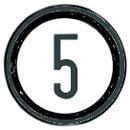
Ditch "about me" and promotional slides
Never spend more than one very condensed, slightly fun slide about yourself, and never spend more than 30 seconds on it.
A good emcee or moderator will introduce you based upon the bio you submitted with some other information from social media stalking. They'll toot your horn. They'll tell the audience why you're qualified to be speaking on this topic.
If you're presenting before clients or a small audience, who may not know you, keep it short and sweet. And if everyone knows you, no need to include it.
An audience wants you to dive right into the good stuff. If you impress the audience with your presentation, they'll be hunting you down. And hopefully, they can do this easily because you've added that information to your slides. Also, a thank-you ending slide with your contact information is always a nice gesture.
 Dive right into the good stuff and ditch "about me" slides to earn audience respect.
Dive right into the good stuff and ditch "about me" slides to earn audience respect.
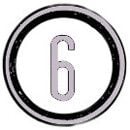
Kill those bullet points
Rarely are bullet points a good idea for your slides, unless you are making a true list. If you find yourself spending any time explaining points, it's definitely time to break them up.
Audiences will read slides before they listen to speakers. Bullet points typically leave slides copy-heavy and speakers ignored. At least for however long it takes for someone to read the slide. Reviewing your outline is a great way to determine if those bullet points need their own slides before you start practicing your talk.
Okay, how do you break up those bullets? Let's say you have five items on your list. Time to turn them into six slides. Slide #1: put down your list's title, e.g. types of social media metrics to track. (Bonus points if you use a font or style signaling that you're transitioning into a deeper dive.) Slide #2: the first bullet, e.g. conversation engagement. Slide #3: the second bullet, e.g. applause engagement, and so on until your list is exhausted.
 Bullet points kill slide decks. Learn more about how and why you should remove them.
Bullet points kill slide decks. Learn more about how and why you should remove them.
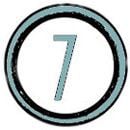
Planning anything beyond static slides? Loop in the event organizers
If you are doing anything beyond just slides—video, audio, musical production, live polling, audience participation, etc.—sync up with the conference organizers well in advance. They want to make sure you look good. Additionally, they may need to order extra equipment or do testing beforehand. And if they say no, be respectful.
If you're trying to explain on-stage to an audience that cool thing you had planned but technical issues prevented you, you're spending a lot of their trust in you (not to mention their attention spans) for nothing. Make sure the flashy fun works and make sure it enhances your presentation.
 Making your slide deck multimedia? Contact event organizers pre-show.
Making your slide deck multimedia? Contact event organizers pre-show.
Print, pin, or share this checklist. Download the high-resolution PDF or snag the image below:

Always keep learning more
Brilliant presentations and their accompanying decks are an art form in their own right. This tips will only take you so far. Besides practice, experience, and getting help and feedback, there are a ton of resources out there to help you improve. Here are some of my favorites:
Books:
- HBR Guide to Persuasive Presentations by Nancy Duarte
- slide:ology: The Art and Science of Creating Great Presentations by Nancy Duarte
- Resonate: Present Visual Stories that Transform Audiences by Nancy Duarte
Articles:
- How to Give a Killer Presentation by Chris Anderson, curator at TED
- How to Become a Confident Public Speaker by Matthew Capala
- The Evolution of My Public Presentations by Rand Fishkin
- The Making of SearchLove by Mack Fogelson
- Too Busy To Succeed: How I let 'busyness' make me choke at MozCon by Adam Audette (make sure to read comments too!)
- 11 Things To NEVER Say In A Presentation by XCamilleWong
- Presentation Horrors: Don’t Do These Things by Ian Lurie
- Being a MozCon Community Speaker: A Look Inside by Zeph Snapp
Videos:
- TED: The secret structure of great talks by Nancy Duarte
- 8 Rules for Exceptional Slide Presentations - Whiteboard Friday by Rand Fishkin
- 30 Tips for Awesome Presentations - Video and Slides by Ian Lurie
Best of luck!
The author's views are entirely their own (excluding the unlikely event of hypnosis) and may not always reflect the views of Moz.

 Outline your way to success
Outline your way to success
![Convince Your Boss to Send You to MozCon 2025 [Plus Bonus Letter Template]](https://moz.rankious.com/_moz/images/blog/banners/eee4a4a8-d4aa-457e-80b1-0ffa186b88ff_2025-06-27-174747_coli.png?w=580&h=196&auto=compress%2Cformat&fit=crop&dm=1751046467&s=454333def17ba9d472d3d98b6786741e)
![How To Drive More Conversions With Fewer Clicks [MozCon 2025 Speaker Series]](https://moz.rankious.com/_moz/images/blog/banners/Mozcon2025_SpeakerBlogHeader_1180x400_RebeccaJackson_London.png?w=580&h=196&auto=compress%2Cformat&fit=crop&dm=1750097440&s=296c25041fd58804005c686dfd07b9d1)

Comments
Please keep your comments TAGFEE by following the community etiquette
Comments are closed. Got a burning question? Head to our Q&A section to start a new conversation.